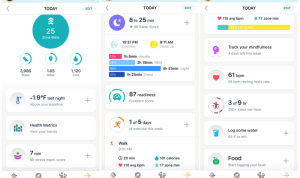The Rise of Refurbished Electronics Are They Worth Buying in 2025 is an intriguing topic as we navigate a world where sustainability meets technology. With the growing emphasis on eco-friendly practices and budget-conscious shopping, refurbished electronics are becoming increasingly popular. This shift invites us to explore what refurbished means, the benefits and potential pitfalls, and whether these products can meet our modern needs without compromising quality.
As we delve deeper into this subject, we will uncover the various aspects of refurbished electronics, such as the different types available, the assurance of quality through certification, and the financial savings they offer. By 2025, as technology continues to advance, understanding the value of refurbished products can empower consumers to make informed choices that are both financially savvy and environmentally responsible.
Refurbished In the ever-evolving world of technology, we find ourselves at a crossroads where human ingenuity meets the power of artificial intelligence (AI). This synergy is reshaping industries, redefining how we communicate, learn, and even live our daily lives. In this article, we will delve into the transformative impact of AI on various sectors, explore the ethical considerations it presents, and envision the future landscape of human-AI collaboration. The Rise of Artificial Intelligence Artificial intelligence, once a concept confined to the realm of science fiction, has become an integral part of our reality.
From virtual assistants like Siri and Alexa to complex algorithms that analyze vast amounts of data, AI is embedded in many facets of our lives. It is not merely a tool; it is a revolutionary force that has the potential to enhance productivity, drive innovation, and solve complex problems. AI in Healthcare One of the most significant areas where AI is making a profound impact is healthcare.
With the ability to analyze patient data rapidly, AI systems can assist doctors in making more accurate diagnoses. Machine learning algorithms can sift through thousands of medical records, identifying patterns that may be invisible to the human eye. For instance, AI can predict outbreaks of diseases by analyzing data from various sources, allowing for proactive measures to be taken.Moreover, AI is revolutionizing drug discovery.
Traditional methods of developing new medications are time-consuming and expensive. However, AI can analyze chemical compounds and predict their efficacy much faster, potentially bringing life-saving drugs to market in record time. Additionally, personalized medicine is becoming a reality, where treatments are tailored to an individual’s genetic makeup, thanks to AI’s analytical capabilities. AI in EducationIn education, AI is transforming the way students learn and teachers instruct.

Intelligent tutoring systems can provide personalized learning experiences, adapting to the pace and style of each learner. This customization ensures that students grasp complex concepts before moving on to the next topic, creating a more effective learning environment. Furthermore, AI can automate administrative tasks, allowing educators to focus more on teaching rather than paperwork. For example, grading assignments can be streamlined through AI-powered software, freeing up valuable time for teachers to engage with their students.
As a result, the relationship between educators and learners can become more interactive and productive. AI in Business The business landscape is also experiencing a seismic shift due to AI. Companies are leveraging AI for data analysis, customer service, and even product development. Chatbots powered by AI can provide 24/7 customer support, addressing queries and issues instantly. This not only enhances customer satisfaction but also reduces operational costs for businesses. In addition, AI-driven analytics allow companies to gain insights into consumer behavior, enabling them to tailor their marketing strategies effectively.
Predictive analytics can forecast market trends, helping businesses remain competitive and innovative in a rapidly changing environment. Ethical Considerations While the benefits of AI are undeniable, it brings forth a plethora of ethical considerations that cannot be overlooked. One of the primary concerns is job displacement. As AI systems become more capable, there is a fear that they will replace human workers in various industries.
This transition raises questions about the future of work and how society will adapt to these changes. Moreover, there are concerns about data privacy and security. AI systems often rely on vast amounts of personal data to function effectively. If not handled correctly, this data can lead to breaches of privacy and misuse. Striking a balance between utilizing data for AI advancement and protecting individuals’ rights is essential for ethical AI development. Additionally, the potential for bias in AI algorithms poses a significant challenge.
If the data used to train AI systems is biased, the outcomes can perpetuate discrimination and inequality. It is crucial for developers and organizations to prioritize fairness and inclusivity in AI training to ensure that these systems serve all segments of society equitably. The Future of Human-AI Collaboration As we look to the future, the partnership between humans and AI is likely to deepen.
Rather than viewing AI as a replacement for human intelligence, we should embrace it as a collaborative ally. The most successful outcomes will arise when humans and machines work together, combining the strengths of both.For instance, in creative fields such as art and music, AI can serve as an inspiration tool, helping artists and musicians explore new realms of creativity.
AI can generate ideas, suggest variations, and even collaborate with creators, pushing the boundaries of traditional artistic expression. Moreover, in fields like science and engineering, AI can augment human capabilities, helping researchers analyze complex data sets and simulate outcomes in ways that were previously unimaginable. This collaborative approach can lead to breakthroughs in research and innovation, driving progress across various disciplines.ConclusionIn conclusion, the impact of artificial intelligence on society is profound and far-reaching.
From healthcare to education and business, AI is transforming how we live and work. However, as we navigate this new landscape, it is vital to address the ethical considerations that accompany these advancements. By fostering a culture of responsible AI development, we can harness the full potential of this technology while ensuring that it serves as a force for good.As we stand on the brink of a new era defined by human-AI collaboration, the possibilities are limitless.
Embracing this change with an open mind and a commitment to ethical practices will allow us to shape a future where technology and humanity coexist harmoniously, enhancing our lives and driving progress for generations to come.




